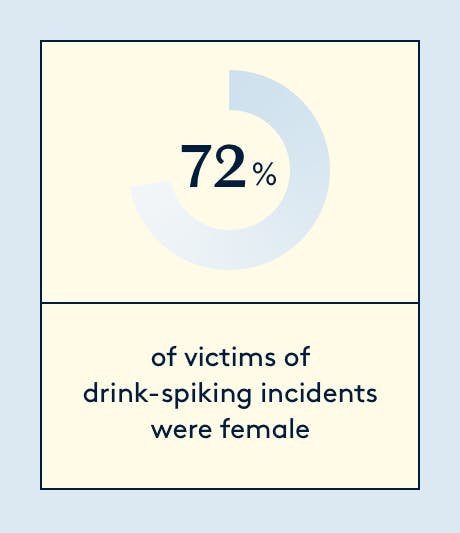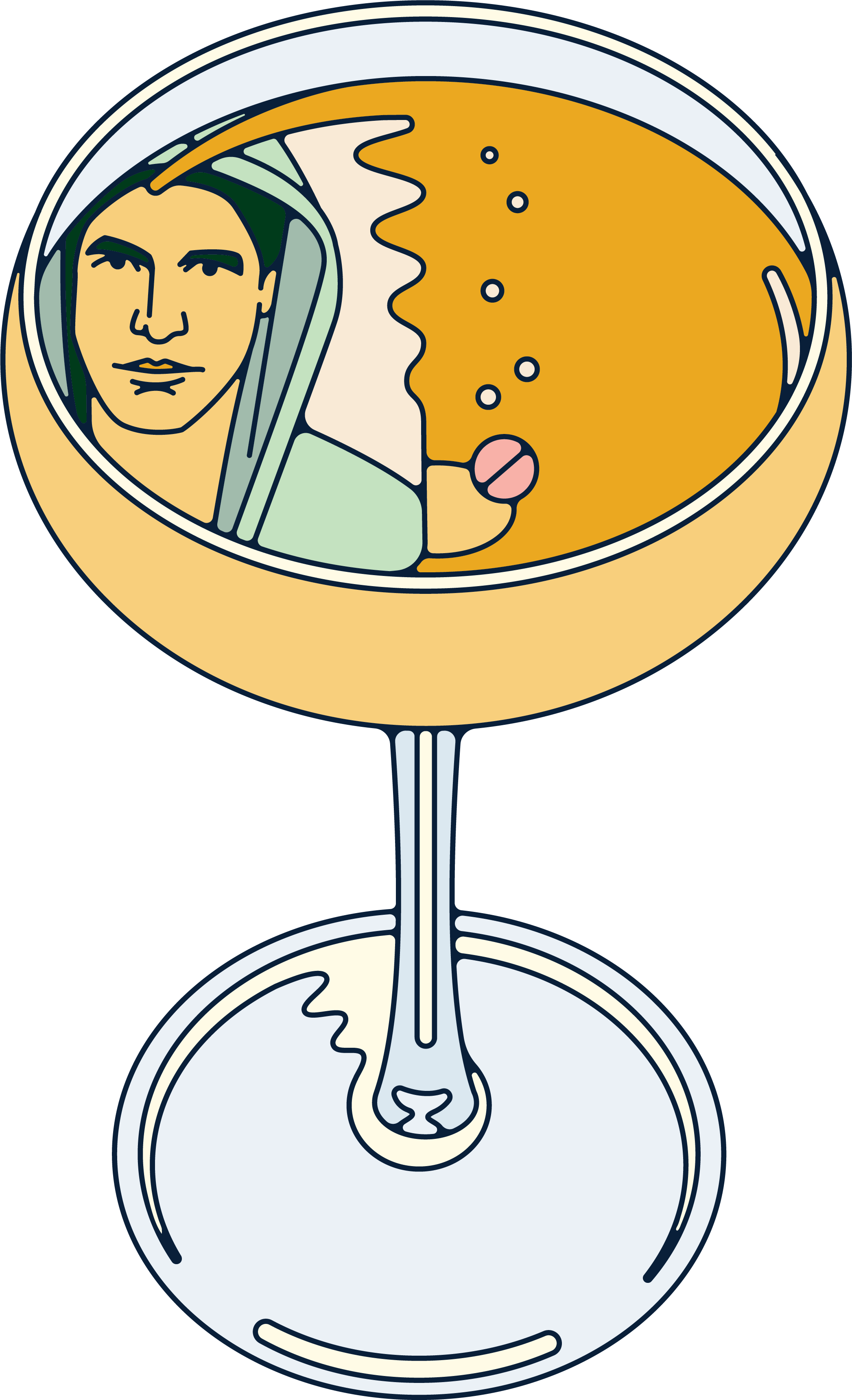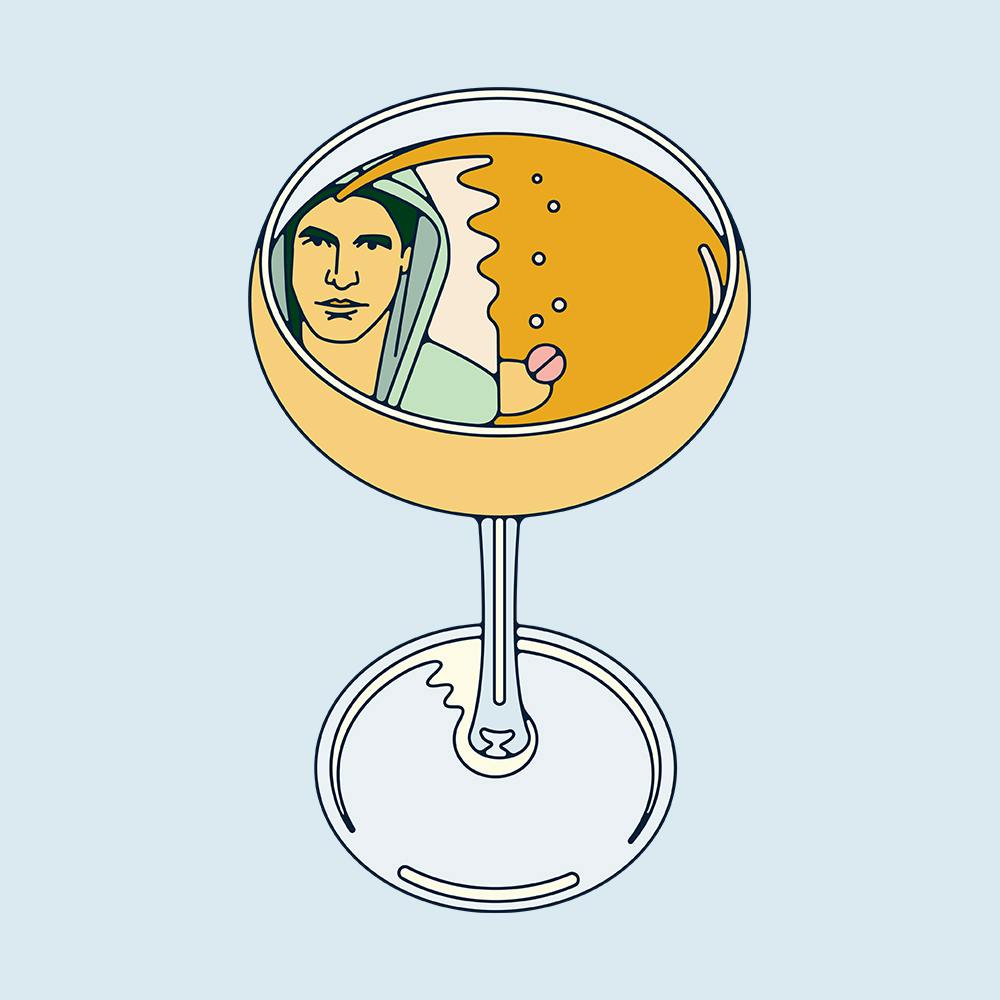Table of contents
Illustrated by Erin Rommel & Sabrina Bezerra
In February 2020 my drink was spiked in a pub where I’d been celebrating my brother’s birthday.
One moment, everything was fine – and the next, I'd lost control of all of my limbs and woke up face down on the floor of a hospital waiting room in a pool of my own dribble and urine.
The experience was completely disorientating, both physically and emotionally. It took me a long time to feel normal again. Trying to navigate a relatively complex system, while also advocating for yourself at a time of such vulnerability is uniquely challenging.
The bewildering mix of fear and confusion alongside the effects and after-effects of an unknown drug that has entered your system without your consent can feel overwhelming.
Cases of drink spiking in the UK have been steadily increasing over the past few years, with those affecting under-18s almost doubling between 2015 and 2018. Over 26,000 cases were reported in the same period. Women are especially vulnerable, based on the same research, accounting for 72% of cases.
The imposition of lockdown last year put a stop to this trend by closing pubs and clubs – the most likely venues for such a crime to take place. For me, this felt like a relief. I would no longer have to find excuses not to go to social events or drink, which had become an anxiety-inducing experience.
But as pubs in England prepare to reopen, the COVID-19 pandemic has pushed important questions around health and safety in social spaces to the surface. And given how worrying the trend was before lockdown, now seems like a good time to highlight the signs of drink spiking and know what to do if either you or someone else falls victim to this crime.

Why do people spike drinks?
According to Drink Aware, “a person’s drink can be spiked to make them more vulnerable for a variety of reasons, including theft, sexual assault or as an attempted joke.”
Unfortunately, though data on this particular crime are sparse – Drink Aware say this is because of a lack of reporting.
What can you do to protect yourself?
The first thing to say is that you absolutely should not have to assume the responsibility of protecting yourself from assault. The focus should be on preventing perpetrators from offending in the first place, which requires more joined-up, strategic long-term thinking from policymakers in collaboration with legislators.
But in the absence of such progressive policies, the most obvious suggestions are never to leave your drink unattended, whenever it is possible to do so.
Other pieces of advice include staying with friends, never accepting drinks from strangers unless you’ve watched them being prepared and trying to stay hydrated by drinking water at regular intervals. Also, if your drink doesn’t taste right, stop drinking it – even if it’s expensive.
It’s also worth saying that it’s incumbent on all of us to look out for each other on nights out, so share this information with your male friends, brothers, boyfriends, sons, husbands etc.
The amount of people (predominantly women) who have since contacted me (either publicly or privately) to tell me that either they or another woman in their life have experienced this is truly astonishing.
“
You should not have to assume the responsibility of protecting yourself from assault
How to know if your drink has been spiked
This is a difficult one because as with anything in life, the way that a substance affects one person to another can vary widely. But trust your instincts.
In my case, my internal alarm started sounding when my limbs started to feel floppy and my thoughts became muddled. As a relatively experienced drinker, I knew that this was not the effect of alcohol – it felt very, very different. If you ever find yourself feeling odd in any way, confide in a friend, or a member of the bar staff.
A Whatsapp conversation with my best friend from the night helped me to piece together a timeline, which was important when I later reported to the police – never assume you’re being dramatic.
If you feel disorientated, lose your balance, feel confused or experience a sudden loss of inhibitions that is out of character, it’s always safer to tell people.

What are the most common drugs
According to Drink Aware, the most common spiking agent is alcohol – whereby victims are given more alcohol than they had agreed to or ordered.
After this, the two most common and most infamous substances used are Rohypnol (roofies) and Gamma Hydroxybutyrate (GHB), both which elicit different effects. Both of these are sedatives, but GHB can make you feel aroused.
Other common substances that are used are more common party drugs such as ketamine (which can make you feel detached and more likely to take risks, according to FRANK) and ecstasy (which can make you feel euphoric and “loved up”). If you’ve never taken recreational drugs before, the feeling could be especially overwhelming.
The best thing you can do if you suspect you have been given any of these substances without your consent is to tell a bouncer, a bartender or a friend.
Should you go to hospital?
The simple answer to this question is: absolutely – if you want to.
Do whatever you need to do to feel safe. In my experience, though, if you have someone that can come with you and advocate on your behalf, it's even better.
NHS staff are always overrun, but especially so in a pandemic – so be patient. And make sure you state explicitly if you can that you are a victim of spiking, or do this for anyone you’re with. The correct procedure in this instance is for your blood to be tested and a toxicology screening to be done, which can identify what substance you’ve been spiked with if it’s common.
In my case, this crucial test didn’t happen, meaning that when I reported the crime to the police, the first piece of evidence was missing. Without it, it was almost impossible for the police to build a case, meaning mine was closed 24 hours after I reported it.
Be insistent if you can. As Claire Waxman, London’s independent victims commissioner, explains: “Rose’s case highlights how vital it is that front line services respond properly to victims, even when seemingly intoxicated. The failure to conduct a toxicology test denied Rose the chance to pursue justice and this should never be the case.”
There is a 72-hour window for a toxicology screening to be undertaken, so it’s important to move quickly should you want to report the case to the police.
Should you report it to the police?
Yes, if you feel comfortable doing so. The process for sexual assault victims is more complex, which you can read about below. But in the event that you are safe, and didn’t go to hospital, reporting the crime can help the police to identify areas where drink spiking is happening – and potentially prevent future crimes.
It also helps the local authorities work with bars to better protect their patrons, so it is important to do if you feel up to it.
What to do if you suspect you may have been sexually assaulted
First of all, it’s important to say that you should do anything and everything you need to do to feel safe. You are under no obligation to tell the police immediately (or at all) or even go to hospital. If you can, tell a friend or family member for support.
If you decide that you’d like to report the assault, you can do so in the first instance online, call 101 or go into a police station. If you or anyone else is in immediate danger, call 999. You can also get in touch with one of the Havens (specialists in dealing with victims of sexual assault) for advice.
If you’d rather go via the NHS, you can get in touch with your GP. If you are in any doubt and would like some confidential advice, Refuge have a 24-hour domestic abuse line, or Rape crisis operate a free hotline.
Take it easy
It took me weeks until I could engage properly in normal life again after my drink was spiked. Not only did I feel exhausted physically from the effects of an unknown drug, but the emotional toll was huge.
My anxiety soared, and I found it hard to be in public spaces. Luckily for me, those spaces soon closed down, making this easier, but my best advice is: go easy on yourself. Do whatever you need to do to feel at ease. If you can afford to speak to a therapist or can get access via the NHS, even better.
We need to work towards better safety measures in place to help women from falling victim to these hideous crimes. Until then, we need to look after ourselves and each other.






